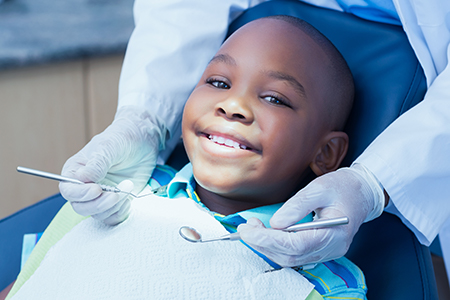
At the office of Lesley Holloway the Dentist, the health and growth of your child's smile is treated with careful attention and practical guidance. We focus on prevention, comfortable experiences, and clear communication so families feel confident at every appointment. Our goal is to help children build healthy habits that last a lifetime.

Good oral health begins long before a child's permanent teeth appear. Introducing gentle daily care, age-appropriate brushing, and a cavity-conscious diet lays the foundation for fewer problems later on. Our team emphasizes practical, positive routines that fit into family life rather than strict regimens that are hard to keep.
We make early visits welcoming and informative, so children learn that the dental office is a safe place. These appointments are as much about building trust as they are about examinations. When kids feel comfortable, they are more likely to cooperate with care and carry healthy habits into adolescence and beyond.
Prevention is at the heart of what we do: identifying risk factors, offering evidence-based protective treatments, and coaching parents on daily practices. Small changes — consistent brushing, limiting sugary drinks, and using fluoride appropriately — produce big long-term benefits for a growing smile.
Our approach balances clinical expertise with a warm, child-centered atmosphere. We explain procedures in plain language, use gentle techniques, and involve families in care decisions so every visit becomes a positive step toward lifelong oral health.

Regular checkups are more than a quick look in the mouth — they are a comprehensive snapshot of growth and oral health. During each visit we review medical history, examine the teeth and gums, assess bite and jaw development, and observe habits that might affect dental growth. This holistic view helps us spot small concerns before they become larger problems.
Examinations are paired with professional cleanings to remove plaque and debris from areas children often miss. We provide age-appropriate toothbrushing instruction and hands-on demonstrations so children and parents leave with clear, achievable steps to follow at home.
When clinically indicated, we use digital radiographs to evaluate tooth development below the surface. These images are taken selectively and with safety in mind; they help detect cavities, monitor erupting teeth, and confirm that jaw bone and tooth roots are developing properly.
Tooth decay is the most common chronic condition affecting children, but it is largely preventable. Cavities develop when sugar and bacteria interact on tooth surfaces, producing acids that erode enamel. Early habits and regular professional care minimize that risk and protect both baby and permanent teeth.
For added protection, our team may recommend dental sealants for back teeth and professionally applied fluoride when appropriate. Sealants form a physical barrier over deep grooves where food and bacteria collect, while fluoride strengthens enamel and helps resist decay when used correctly.
Beyond in-office measures, we focus on practical advice for parents: reducing frequent snacking on sugary items, encouraging water instead of juice, and supervising brushing routines until children can effectively clean their own teeth.
Small, consistent actions at home make a major difference. Establish a brushing routine twice daily with a soft-bristled brush and a rice-sized dab of fluoride toothpaste for very young children. Supervise and support brushing until manual dexterity and habits are reliable.
Begin dental visits early to build familiarity and trust
Clean baby teeth and gums gently after feedings and before bedtime
Avoid nursing or bottle-feeding at sleep time with milk or juice
Bring children for routine dental visits and professional cleanings as recommended
Model and reinforce proper brushing and flossing techniques
Choose nutrient-rich snacks and limit sugary drinks, favoring water
Help children give up pacifiers and thumb-sucking at developmentally appropriate times
Use a custom or well-fitted mouthguard when children participate in contact sports

Primary teeth play essential roles in eating, speaking, and holding space for adult teeth to come in straight. Even before teeth erupt, caregivers can promote oral health by wiping gums after feedings and avoiding prolonged exposure to sugary liquids at bedtime. These early habits lower the risk of early childhood tooth decay.
We encourage families to schedule a baby’s first dental visit by about the first birthday or when the first tooth appears. That early appointment is brief and focused on prevention — helping parents learn safe cleaning methods, discussing diet, and answering questions about teething and pacifier use.
When teething causes discomfort, simple soothing techniques like chilled teething rings or a clean, cool cloth often help. If concerns arise — for example, unusual swelling or very high fever — parents should contact the office for advice and evaluation.
Facial growth and jaw development influence how teeth come together and whether orthodontic treatment might be recommended in the future. We routinely assess the relationship of the jaws and the way teeth erupt so that any issues can be detected early and managed at the most appropriate time.
Guidance about nutrition goes hand in hand with growth monitoring. A balanced diet supports strong teeth and bones; calcium, vitamin D, and protein contribute to healthy development. Limiting sticky, sugary snacks and promoting whole foods helps protect enamel and supports overall health.
If early signs suggest an orthodontic concern — such as crowding, crossbite, or asymmetric jaw growth — we’ll discuss timing and options with you. Early interceptive care can simplify later treatment in some cases, while in other situations observation is the best strategy.
We coordinate with orthodontic specialists when appropriate, ensuring care plans align with each child’s growth patterns and functional needs so that treatment, when necessary, is efficient and minimally invasive.
Children who play sports or are active outdoors benefit from properly fitted mouthguards. A custom mouthguard provides superior protection compared with store-bought options, helping reduce the risk of chipped or knocked-out teeth as well as soft-tissue injuries to the lips and tongue.
Accidents happen, and timely care can make a major difference after a dental injury. Whether a tooth is chipped, displaced, or avulsed (knocked out), prompt evaluation and treatment help preserve oral health and improve outcomes. Our team is experienced in managing pediatric dental emergencies in a calm and efficient manner.
Beyond emergencies, we guide families on everyday safety: using protective gear for sports, removing hazards that could cause falls during play, and supervising activities appropriate to a child’s age and development.
Throughout childhood and adolescence, our focus is to provide practical prevention, clear guidance, and compassionate care — supporting children so their smiles stay healthy as they grow.
At Lesley Holloway the Dentist, we partner with families to protect developing smiles through prevention, education, and timely treatment. If you have questions about pediatric dental care or would like more information about how we can help your child, please contact us for more information.
Children should have their first dental visit by their first birthday or when the first tooth appears. Early appointments are brief and emphasize prevention, safe cleaning techniques, and guidance for parents about feeding and teething. These visits help identify early concerns and set the stage for routine care as your child grows.
At the office of Lesley Holloway the Dentist we use that first visit to answer questions, demonstrate gentle oral care methods, and discuss healthy habits that protect baby teeth. Making the dental office a familiar, positive place during infancy reduces anxiety and improves cooperation at later visits. Parents leave with clear, practical steps to support their child’s oral development at home.
Caring for an infant’s mouth begins before teeth appear by gently wiping gums with a clean, damp cloth after feedings and before bedtime. Once teeth erupt, use a soft-bristled infant toothbrush and a rice-sized smear of fluoride toothpaste to clean teeth twice daily and remove plaque. Supervise brushing and replace the toothbrush regularly to maintain effective cleaning.
Avoid putting a child to bed with a bottle containing milk or juice, and favor water between meals to reduce prolonged sugar exposure on developing enamel. Regular checkups let the dental team monitor tooth eruption patterns and offer tailored advice on pacifier use, thumb-sucking, and safe teething remedies. Consistent routines and early education for caregivers greatly reduce the risk of early childhood tooth decay.
A routine pediatric dental exam includes a review of medical and dental history, a careful examination of teeth and gums, and an assessment of bite and jaw development. The clinician inspects tooth surfaces for signs of decay, checks soft tissues, and evaluates habits such as tongue thrusting or prolonged pacifier use that can affect growth. Professional cleanings accompany exams to remove plaque and polish teeth in areas children often miss.
When clinically indicated, we use digital radiographs selectively to evaluate developing teeth below the surface, monitor root formation, and detect hidden decay with minimal exposure. The exam also includes age-appropriate instruction and hands-on demonstrations to help children learn effective brushing and flossing techniques. Parents receive clear recommendations and a follow-up plan tailored to their child’s needs.
Cavities develop when bacteria in the mouth metabolize sugars and produce acids that erode tooth enamel over time. Frequent snacking on sugary or sticky foods, prolonged exposure to juice or milk, and inconsistent brushing increase the risk of decay in both baby and permanent teeth. Early habits and routine professional care are the most effective ways to reduce that risk.
Preventive measures include establishing twice-daily brushing with fluoride toothpaste, supervising flossing as appropriate, and limiting sugary beverages and snacks. In the dental office, clinicians may recommend protective treatments such as professionally applied fluoride or sealants for children at higher risk. Regular checkups allow the team to identify early changes and intervene before small issues become more serious.
Dental sealants are thin, protective coatings applied to the chewing surfaces of back teeth to fill deep grooves where food and bacteria can collect. Sealants create a physical barrier that makes those surfaces easier to clean and substantially lowers the chance of decay in molars and premolars. Application is quick, painless, and can be done during a routine visit when the tooth surface is clean and dry.
Sealants are commonly recommended for children as their permanent molars come in, typically between ages 6 and 14, and for any child with deep grooves or a history of cavities. The dental team evaluates each child’s individual risk and discusses whether sealants are an appropriate preventive option. When combined with good home care and regular exams, sealants are a highly effective tool for protecting developing teeth.
Children who feel anxious about dental care benefit from a calm, child-centered approach that builds trust through clear communication and gradual exposure to procedures. Clinicians often use the tell-show-do technique, friendly language, and positive reinforcement to explain steps and reduce fear. Short, predictable visits and hands-on demonstrations help children feel more in control and less anxious over time.
When additional support is needed, the team offers a range of comfort-focused measures and will discuss appropriate options with parents to ensure safe, compassionate care. Creating a relaxed, low-stress environment and involving caregivers in the process helps many children transition to routine, cooperative visits. Our goal is to foster a positive relationship with dental care that lasts into adolescence and adulthood.
Children should have an orthodontic evaluation by around age 7 or earlier if parents or the dentist notice problems such as crowding, crossbite, early or late loss of baby teeth, or difficulty chewing. Early evaluation allows clinicians to monitor jaw growth and tooth eruption so they can recommend timely intervention when necessary. Not every child needs early treatment, but regular monitoring helps identify issues that may benefit from interceptive care.
When early signs of orthodontic concerns are present, the dental team will discuss potential approaches, including observation, simple appliances, or referral to an orthodontic specialist for coordinated care. The goal is to choose treatments that support healthy development while minimizing complexity later on. Clear communication between the family, dentist, and specialists ensures that care aligns with each child’s growth pattern and functional needs.
In a dental injury, quick, calm action improves outcomes and reduces the risk of long-term problems. For a chipped or fractured tooth, rinse the mouth with warm water, apply a cold compress to reduce swelling, and contact the dental office promptly for evaluation. For a knocked-out permanent tooth, pick up the tooth by the crown (not the root), rinse it gently with water if dirty, and try to reinsert it if possible while seeking immediate dental care.
If reinsertion is not possible, keep the tooth moist by placing it in milk or a tooth-preservation solution and bring it to the dentist right away; prompt treatment increases the chance of saving the tooth. For knocked-out baby teeth, avoid attempting reimplantation and contact the office for guidance, as reimplanting primary teeth can damage developing permanent teeth. The dental team will assess the injury, provide necessary treatment, and outline follow-up care to support healing and function.
A balanced diet supports strong teeth and proper jaw development, with nutrients such as calcium, vitamin D, and protein playing key roles in mineralization and growth. Frequent consumption of sugary and sticky foods increases the risk of tooth decay by exposing teeth to fermentable carbohydrates that feed harmful bacteria. Encouraging whole foods, regular meals, and water as the primary beverage helps protect enamel and supports overall health.
Snacking habits and timing are as important as food choices; limiting between-meal sugary snacks and avoiding prolonged sipping of juice or sweetened drinks reduces acid attacks on enamel. The dental team provides age-appropriate nutrition guidance and practical tips to make healthy choices easier for families. When necessary, clinicians coordinate dietary advice with pediatric providers to support a child’s comprehensive development.
Children who participate in contact or high-velocity sports greatly benefit from wearing a properly fitted mouthguard to reduce the risk of chipped, fractured, or knocked-out teeth and to protect soft tissues. Custom mouthguards made by the dental team offer superior protection and comfort compared with off-the-shelf options because they are molded to each child’s teeth and bite. A custom guard fits securely, allows for easier breathing and communication, and is less likely to be removed during play.
The fitting process is simple and typically involves taking an impression or a digital scan of the teeth, then fabricating a durable guard that meets the child’s sport and growth needs. The dentist will instruct you on proper care, cleaning, and when to replace the guard as your child’s mouth changes. Wearing a well-fitted mouthguard is an effective, practical step to safeguard a child’s smile during athletic activities.
Quick Links
Contact Us